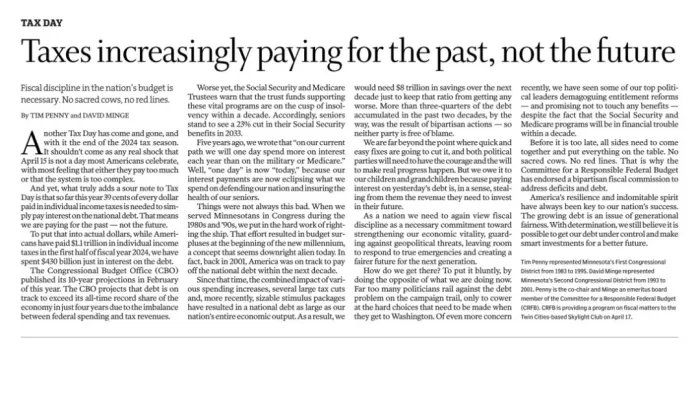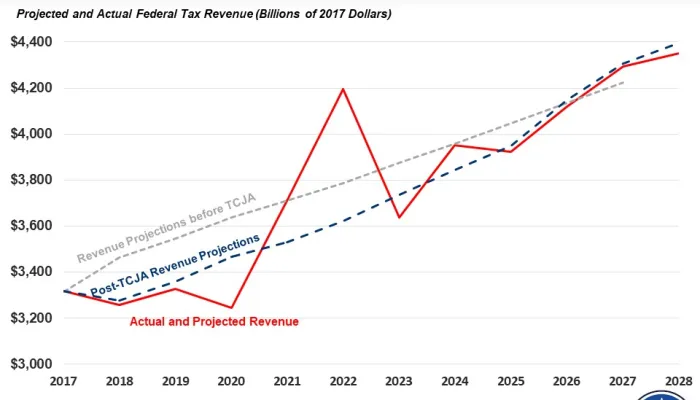Gene Steuerle: The Baucus-Hatch “Blank Slate” Approach to Tax Reform Could Be Revolutionary
The lead up to July 4th brought an exciting development in fiscal policy discussions: a commitment from Senate Finance Committee Chairman Max Baucus (D-MT) and Ranking Member Orrin Hatch (R-UT) to use a "Blank Slate" approach in tax reform. The Blank Slate approach, similar to the "Zero Plan" that was key in the Fiscal Commission's recommendations, would start by eliminating all tax expenditures in the code, thereby putting the onus on lawmakers to justify which should be added back in at the cost of higher tax rates.
Urban Institute fellow and CRFB board member Gene Steuerle, who worked at the Treasury Department during the 1986 Tax Reform Act process, argues in a recent blog post that this approach could potentially be "revolutionary." Steuerle explains:
Baucus and Hatch must accomplish two goals. First, they must shift the burden of proof from those who favor reform to those who would retain the status quo. Second, they must force members to pay for their favored subsidy, denying them the opportunity to pretend it is free.
As a veteran of the Tax Reform Act of 1986, I always emphasize the crucial role of process. Sure, serendipity smiles or frowns unexpectedly on any endeavor, but the ’86 effort took off when Treasury, President Reagan, House Ways & Means Chair Dan Rostenkowski (D-IL), and Finance Committee chair Bob Packwood (R-OR) all put forward proposals that started with specific rate cuts and removal of many tax preferences.
Their plans were all somewhat different, but each changed the burden of proof. Lobbyists won many later battles, but now they were forced to explain why they needed to retain special preferences when others would not be so favored. Moreover, given a fixed revenue target, restored preferences had to be paid for. Lawmakers had to acknowledge that the price of adding back tax preferences was a higher tax rate.
It is this acknowledgement of trade-offs that is so important and what makes a blank slate approach appealing. In addition, by forcing lawmakers to consider both the costs as well as the benefits, the tax provisions lawmakers choose to keep will likely be redesigned to be fairer and more efficient. If lawmakers truly follow this process, Steuerle suggests this method could be repeated elsewhere in the budget, moving toward the comprehensive approach that we support:
This process not only gives new life to a broad rewrite of the tax code but also makes it much easier to reform specific provisions. For instance, tax subsidies for homeownership, charity, and education can be much more effective and provide more bang per buck out of each dollar of federal subsidy. But politicians largely ignore such ideas because they create losers who scream loudly. Thus, the default for elected officials who fear negative advertising and loss of campaign contributions is to do nothing to improve these tax subsidies.
But when the burden of proof changes, a lobbyist can appear to be helping his masters simply by saving a subsidy, even if the net benefit is smaller than in the old law. After all, preserving a preference in some form is success relative to a zero baseline. Of course, as we learned in 1986, this argument grows stronger as the probability of tax reform grows. Can Baucus and Hatch change the burden of proof and force members to pay with higher rates for the subsidies they want to keep? They can certainly lead their committee and Congress in that direction, but only by specifying precisely a chairman’s mark that sets revenue and rates while slashing tax preferences.
If they do, Baucus and Hatch may force fellow senators to acknowledge that every subsidy must be paid for. And that, in turn, will open a window to design alternative tax subsidies that are fairer and more efficient. This sort of process revolution could remake policy in ways that extend well beyond tax reform.
Click here to read the full piece.
"My Views" are works published by members of the Committee for a Responsible Federal Budget, but they do not necessarily reflect the views of all members of the committee.


